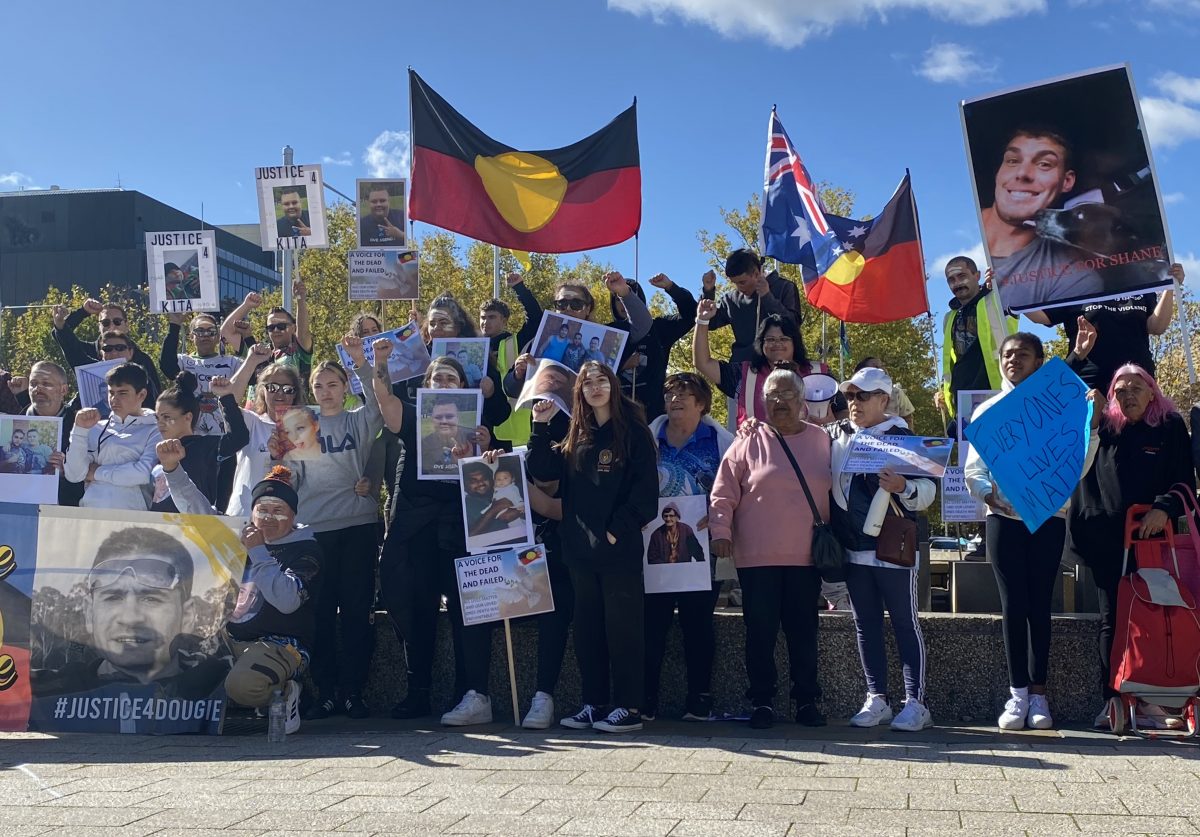
Protesters gathered at the ACT Legislative Assembly calling for change, feeling their loved ones were let down by government services. Photo: Claire Fenwicke.
CONTENT WARNING: This article discusses and features photos and the names of Indigenous people who have died.
Holding high banners of their loved ones, protesters descended on the ACT’s Legislative Assembly demanding change.
The Voice for the Dead and Failed march was organised by Selina Walker, whose cousin Nikkita Drazevich was found deceased in remote grasslands near Lawson earlier this year.
The Ngunnawal woman presented an open letter to all levels of government – particularly singling out the ACT and NSW Governments – saying she was sick of seeing people die slowly because the systems had failed them.
“On behalf of those who have lost their lives, their voices through death or continual systemic failure of the systems here to help and protect them, we no longer accept the lack of responsive services we are receiving, including cultural responsiveness,” Ms Walker said.
“We’re tired of burying our loved ones, or watching our loved ones die slowly before our eyes because they couldn’t get the appropriate help they needed.”
Ms Walker has lost three cousins, two to suicide and one to murder, all of whom had accessed various services, including mental health and drug and alcohol support.
Her family is still waiting for an answer on what happened to Nikkita, 11 weeks since she was found, with the investigation continuing. The family has been accessing help through Victim Support, Gugan Gulwan and Winnunga Nimmityjah.
Frustrated, Ms Walker wants to see real change.
“I’m calling for action. I’m tired of sitting around tables and talking, talking to ministers, service providers – it falls on deaf ears. There’s no change,” she said.
“Nikkita, in particular. She repeatedly asked for help over the past 18 months, repeatedly presented at emergency departments, repeatedly went to the Adult Mental Health unit and was discharged.”
Ms Walker said while she felt the ACT had a lot of services available to identify and direct people into the correct pathways, more funding was still needed, especially for culturally appropriate services.
“I think we’ve got a lot of access to services here, the response we get from them, though, is not culturally informed, it’s not trauma-informed – the responses are not good enough,” she said.
“And it’s not just Black people who are receiving this kind of treatment. We’re not the only ones going through this and it’s not acceptable.”
Another face in the crowd was Kristie Watson, whose brother Shane was found dead near the Tuggeranong Parkway less than two weeks ago.
The circumstances surrounding Shane’s death are also under investigation, with his cause of death still unknown, but this isn’t the first brother Ms Watson has had to bury.
Her brother Nicholas died less than three years ago, and Ms Watson said it was because he was let down by the system as well.
“Nicholas reached out to services for over a year for mental health [support]. He reached out for drug and alcohol [services]. He went to the mental ward a couple of times … they gave him prescription medication and sent him home knowing he had drug and alcohol issues as well,” Ms Watson said.
“They didn’t get a bed for rehab for more than six months, and by the time he did get that bed, it was two days too late.”
Ms Watson, who works in the community sector, said ACT support services needed more funding for more workers on the ground.
“There’s just not enough for people to support the people in the community who are suffering right now in Canberra,” she said.
“I want to see more rehabilitation centres in Canberra … mental health is a big one [as well].”
Shorter wait times for public mental health services and other support services were another major theme at the protest.
Ultimately, those gathered hoped they wouldn’t have to keep burying loved ones who had fallen through the cracks.
“We request all systems and services respond appropriately to the adversity that patients, clients, humans present when asking for help,” Ms Walker said.
“The faces of our dead and failed haunt us daily. Every life matters.
“We want our voices genuinely heard. We want action so we can stop burying the voices of our people.”
If this story has raised issues for you, you can contact Lifeline on 13 11 14. If it is an emergency, call 000.












